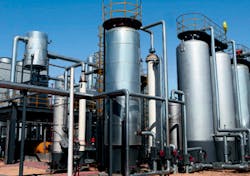Rittal is a traditional German company that makes products in its home country for the European market, where it dominates the enclosure market. But when it comes to selling products in North America, 80 percent of those are actually made in the U.S. Now the manufacturer of industrial and IT enclosures, racks and accessories is putting even more emphasis on its U.S. operations, opening a new customer service center in Houston that’s dedicated to the oil and gas industry.
“The center of the universe for oil and gas is Houston, not Frankfurt,” says Tony Varga, senior vice president of North American sales for Rittal. “That’s really a change for us.”
The Oil and Gas Competency Center is Rittal’s first competency center outside of Germany, and is placed in Houston specifically to take advantage of the city’s heavy concentration of engineering firms in the oil and gas industry. At the center, customers and engineering firms will be able to do system engineering, training and project management on-site.
“Our customers will be able to see the products in our state-of-the art showroom and design a system right here in the facility,” says Jim Barth, Rittal’s regional sales director. “They will be supported by our solution and sales engineering team, allowing them to have hands-on access to Rittal products to ensure the design is complete. They’ll not only be able to ensure a good fit, but they’ll understand how it’s assembled and see how it works.”
In addition to the showroom, the competency center includes two large training rooms, a hands-on room for assembling various components, and a Rittal automation system installation, which offers the ability to modify enclosures and cutouts for assembly.
Along with the automotive and food and beverage industries, oil and gas is one of the three largest segments that Rittal serves. Its enclosures and climate control systems are used in the oil and gas industry for exploration and production, transportation and storage, refining and processing—optimizing physical work spaces and minimizing the damaging effects caused by tough operating conditions.
The competency center operates as part of Rittal’s efforts to get closer to its customers, making products in the same geographical location as the market it’s serving, with testing done in-house. Customers in the U.S. are guaranteed a delivery time of no more than 48 hours for standard products. Parts produced in Urbana, Ohio, are delivered to logistics centers in Atlanta; Sparks, Nev.; and Houston—putting them within a 400-mile radius of every metropolitan area in the country.
To take that concept even further—and get even closer to customers—Rittal is launching a program to create modification centers at 10-12 partner locations around the country. Called the Rittal Authorized Modification Program (RAMP), a limited number of partners will be fully integrated to customize standard products from Rittal, enabling them to get orders out to customers faster.
“We’ve done this in Mexico and Canada for four to five years,” Varga says, noting that almost half of Rittal’s U.S. customers want something special done to the off-the-shelf enclosures. “If we can move that work out of the factory, it will give us the ability to expand and just make more standard product.”
Rittal is beta testing the program now with two partners in Atlanta and California, and the new competency center in Houston will also have a modification facility, Varga notes. He expects the full program to launch by the third quarter this year.
About the Author
Aaron Hand
Editor-in-Chief, ProFood World

Leaders relevant to this article:
